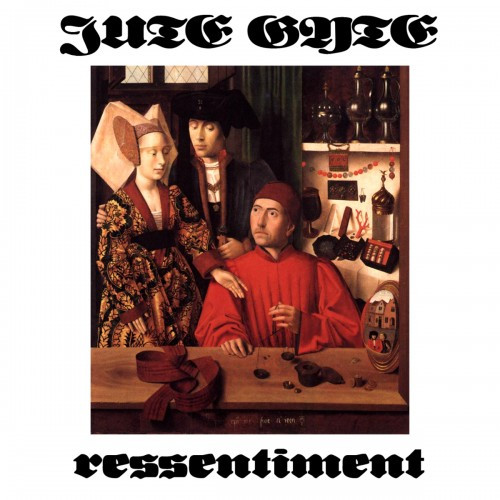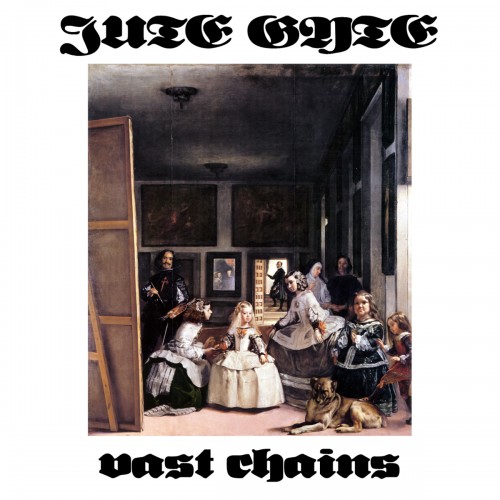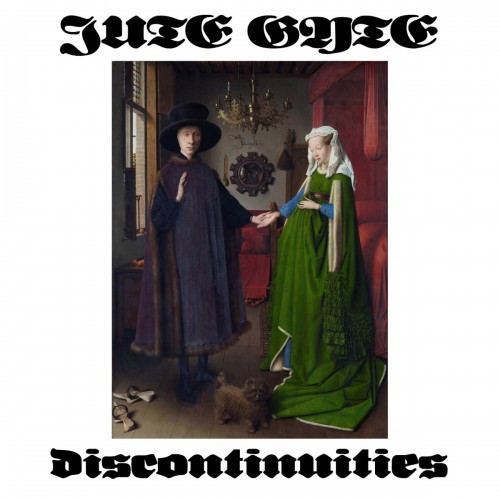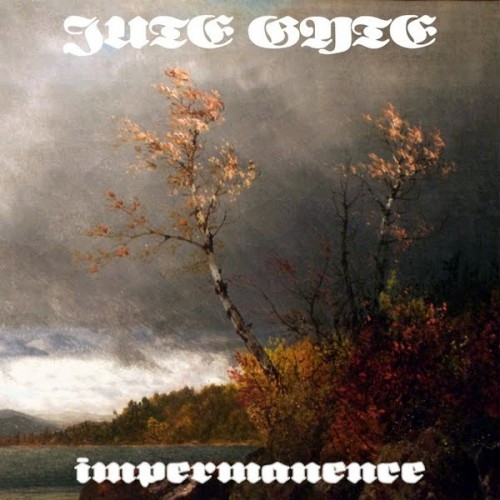(Austin Weber snagged a rare interview with Adam Kalmbach, the man behind Jute Gyte, and here it is.)
I’ve been a very big fan of the experimental microtonal black metal group Jute Gyte for a long time now, and recently reviewed his new album, Ressentiment, here at NCS. So I decided to try and set up an email interview with sole member Adam Kalmbach, and he was gracious enough to answer all of my questions. As you will see below, he is a very well-read, articulate, and intelligent artist.
********
I remember reading an old interview with you somewhere on the internet where you said that you had a lot of music written before you ever recorded anything. I mention that because I noticed at the credits portion of the Ressentiment album page on Bandcamp that this music was written in 2011-2012. Do you still have a glut of music to record, or are you working mainly from fresh material now?
Though very occasionally I come across something I wrote down but never recorded, I think the situation you’re referring is actually that I had a lot of music recorded but not released. Ressentiment, like Vast Chains and Discontinuities, was put together over a two-year span ending in 2012, but it is only now being released. I am happy to say that I am working on fresh black metal material now. I have a lot of electronic material I’m sifting through and endlessly revising but I suspect that will always be the case.
Were you ever a part of any bands pre- Jute Gyte that involved other people?
Nothing pre-Jute Gyte, though I’ve occasionally tried playing music with others. About five years ago I was part of a group with a bassist and drummer I am friends with, but we never made it past the rehearsal stage. Playing music with other people can be fun and educational but I am so accustomed to my own way of working that quotidian band stuff, like playing the same material again and again and not having total control over the material, seems burdensome.
In our previous correspondence you mentioned that your lack of social media presence was due to who you are as a person and your personality outweighing the advantages it could bring. Could you elaborate on that more? Do you wish to be left alone? Or is it more because you are a fierce defender of yourself and your work and don’t want to squabble with people online?
I’m not a particularly social person and honestly sort of despair at social networking. I can’t think about a site like Facebook without being reminded of the videophony section of Infinite Jest. If I have anything of interest to say I think it is in my music or maybe in an in-depth conversation about music. I don’t think I’m likely to engage in squabbling in defense of my work – when you make weird microtonal black metal and electronic music you have to accept that some/most people will dislike it.
How did you come to be involved in creating microtonal music? And as a performer of microtonal metal, how do you feel about the non-microtonal metal music being created?
I think my first exposure to formalized microtonal music was in college, where I was fortunate enough to hear some recitals of Harry Partch’s work using recreations of Partch’s instruments. I had also heard music with continuous glissandi for strings by Xenakis, Penderecki, Gloria Coates, etc., but hearing sustained microtonal pitches made an impression. Regarding your second question, non-microtonal metal is of course the overwhelming majority of metal and so I like some, dislike some, and have no opinion about most. While I like microtones and find them tremendously expressive in my own practice, I am not interested in being a crusader for their adoption by others.
Are you a schooled musician or largely self taught?
I have a BA in music, though some of my early albums predate my college education.
Do you have a career or are you just a day job kind of person
I choose to work part-time so that I can pursue my musical work.
How do you find the time to create so much music?
See above. I don’t have a career or children. I’ve constructed my life around making music. I also do everything myself and so avoid the time sinks of coordinating rehearsal time, studio time, etc.
Is there an end goal or point you are trying to reach with Jute Gyte? Will it ever run its course and you move on to a exploring a different style or sound?
I don’t have an endpoint in mind for Jute Gyte as a project because, wisely or not, I created Jute Gyte as a polystylistic outlet for all my musical thought and thus there is not a single Jute Gyte style or sound. I hope that there is a single artistic voice that comes through in all my work regardless. I intend to continue making music until I am unable or feel that I am no longer progressing.
Has the increased visibility and mentions of Jute Gyte across the online metal blogosphere translated into higher CD sales or more Bandcamp downloads/listens? Were you aware that Jute Gyte has spread considerably in the metal world? Do you care?
I care. Bandcamp displays what sites redirect users to my page and so I’m aware of interest in my work. It is flattering when people like my music, and I suspect they do a better job promoting it than I’ve ever managed.
Related to the previous question, I think I saw you are on a small two-band-roster label. Is this one you run?
Physical versions of my albums are released through Jeshimoth, a tiny label I started with friends over a decade ago.
Since you are the sole member, how do you approach composing? To expand on that, I assume you must record your own music? Is there anyone nearby to get pissed when you record instruments or record vocals?
Sometimes I start by determining a guitar tuning or tunings. Other times I think of a distance model to use in generating a scale, or an interval series or a way to manipulate a series. In these cases once I have a basic premise I can start posing questions, like problems to be solved, as a way to navigate the musical space and exhaust the premise’s possibilities. For instance, if I start out by choosing a tuning, I might then decide to play in a (synthetic) scale that uses only the intervals not represented in the tuning, or vice versa. Alternately, a riff might come to mind fully-formed, in which case I would refine it and create variations and counter-riffs, which is just another way of working out the possibilities inherent in the musical idea. I record everything on my own. I record guitar tracks to a click track one layer at a time, then create an arrangement and add drums. Later (often months or even a year later) I add bass and finally, when I complete lyrics, I add vocals. I record guitar tracks one at a time as I write material, but usually record an album’s worth of bass and vocals in one day each. I have a partner but she doesn’t get pissed when I record.
Would I be correct to state that philosophy and psychology are major themes within the world of Jute Gyte? It just seems that way to me, and as such I am curious as to what effect that has on who you are as a person and how you think and what you believe.
The philosophy that I try to express lyrically and that I feel to be true is what Lovecraft called “indifferentism” and what would generally be called philosophical pessimism a la Schopenhauer, Ligotti, etc. An unduly brief version: human life is insignificant within the vastness of space-time, and all events, including all human thoughts and actions, are on a macro level deterministic, on a microlevel indeterministic, and at no level compatible with the concept of free will. Humans, and likely certain other creatures, are afflicted by consciousness, an unfortunately adaptive trait that causes those burdened with it to experience suffering as an overpowering default condition of life on the hedonic treadmill. This consciousness creates an endlessly recursive self-model and gives us the illusion of agency when really we are cogs in a machine.
At the time I was writing the lyrics for Ressentiment (2011-2012) I hadn’t yet arrived at the conclusion that free will is an illusory byproduct of consciousness and was still wrestling with the existentialist emphasis on free will despite/beyond facticity, which in the end seems like hollow mysticism to me. With the title Ressentiment I mean to refer to humankind’s recognition of the feebleness of all life and subsequent recoiling from that recognition in the form of what Ernest Becker called “the denial of death”, the value inversion that is at the heart of all culture.
Do you feel any kinship to other black metal acts or do you feel what you do is completely separate?
No music is separate from other music. I feel the one-way kinship of the diligent listener for certain black metal acts, especially solo artists like Burzum or Judas Iscariot whose works I have listened to countless times. The one-way kinship I’m talking about is the knowledge of a musical personality, a facet of a mind expressed in the abstract language of music, that a listener gradually attains by listening with care to a person’s body of work. When the music is made by a single person the sense of an individual personality is more pronounced. This feeling of recognition is one of the things that makes art worthwhile. The phenomenon is not limited to black metal, of course. Making music is in many ways quite dismal – a lifetime spent sitting alone in a room – and it is heartening to find, in the music that has enriched my life, seeming evidence of another person who has faced such circumstances.
How many Jute Gyte releases do you have in the pipeline for the rest of 2014 and or 2015? Will the tracks from your split EP earlier this year ever become available on your Bandcamp page?
I don’t have any other releases scheduled for 2014. I plan to release two albums in 2015: an electronic album and a black metal album that I hope represents a considerable advance on the style of Ressentiment. I don’t know the long-term fate of those two split tracks. I think they are stylistically a sort of midpoint between Ressentiment and the stuff I’m working on now. If I end up doing more limited-release splits I might eventually make a compilation of them.
A common question that comes up in discussions on our site, is how individuals feel as to whether metal is continuing to evolve and stay fresh, or instead, as some think, is completely stagnant. Your take?
It is difficult to generalize when there is so much metal out there, but I tend towards the former. I think that even if an artist’s aims are derivative they will inescapably introduce differences from their model, and these differences will accumulate over time in an evolutionary process.
How old are you and how do you feel about your life and what you have accomplished so far with Jute Gyte? Do you have other interests or deep passions besides creating music with Jute Gyte?
I have no idea how to feel about my life or what I have accomplished musically. I usually feel annoyed and disappointed by an album within a month or so of finishing it. Compared to whatever I’m currently doing, the previous work always seems primitive. I’m only able to reevaluate an album and consider it in the context of my other work a few years later. Even then I don’t really know how to feel about it. In a meaningless deterministic reality everything a person does is meaningless and determined, including making music. I’ve rewritten this answer several times and spent more time on it than the other answers combined and I don’t think I can do better than that.
Does your family or work or friends know you are Jute Gyte and the music you create? Or do you keep that hidden among those you come in contact with in real life where you live?
People I am close to know that I make weird metal music, but, with a few exceptions, it’s not like there are long discussions about it. To the average person, making metal music is a practice on par with model trains or stamp collecting.
I know you live in Missouri. Is where you live rural or within a city? Additionally how has that impacted the creation of your music?
I grew up in the rural Ozarks, a region that is geographically sublime and culturally backward for a variety of reasons. If you’d like an accurate depiction of the area, I recommend the novels of Daniel Woodrell. The absolute isolation from real musical culture in the pre-internet era probably shaped my musical ethos.






Interesting and profound music, so I’m not surprised the artist have things to say that are equally as interesting and profound. As a metal artist, I know what it takes to sit in isolation in a room and record for hours on end, with the results being meaningless in the grand scheme of things. Its also refreshing to hear a black metal artist say “I care”. I will definitely be giving the Jute Gyte catalogue a good listen in the next few weeks.
I’ve just returned to reading the site and the amount of content that you guys post that’s just right up my alley is ridiculous! Jute Gyte is one of most original and daring projects of late. I don’t always enjoy his stuff, but when I do, it hits really hard, like an abrupt realization (if that makes any sense). His total aversion to formalism and sentimentality (in the tradition of classical avant-garde, I suppose) is also charming, I wouldn’t say worthy of praise, because I think it hinders him a little from making a “definite statement” artistically. I think it’s because consonance is almost totally missing from his music. Is this a byproduct of the micro-tonal tuning, or is it the composition itself? Or of the pessimistic attitude that comes from the belief in determinism? I’m not resolved on that last one anyway, perhaps that’s why I still enjoy music that sounds hopeful.
I would say that the way in which Jute Gyte sounds different than others, is a “definite statement” artistically in itself. It sets him apart, and shows that what he is doing is unique. It may not be as pleasing to your ears personally, but to me, its incredible and refreshing.